Tea is something I drink every single day. It’s sacred at my house – I even have a whole drawer devoted to it! I drink it because it is amazing for your health. There are so many varieties of tea that can improve digestion, metabolism and even prevent certain diseases. This investigation into tea ingredients has been in the making for a long time. What I’m about to share with you totally rocked my world forever and I’ll never look at tea in the same way again. Do you really want to know what’s in your tea?…Then read on.
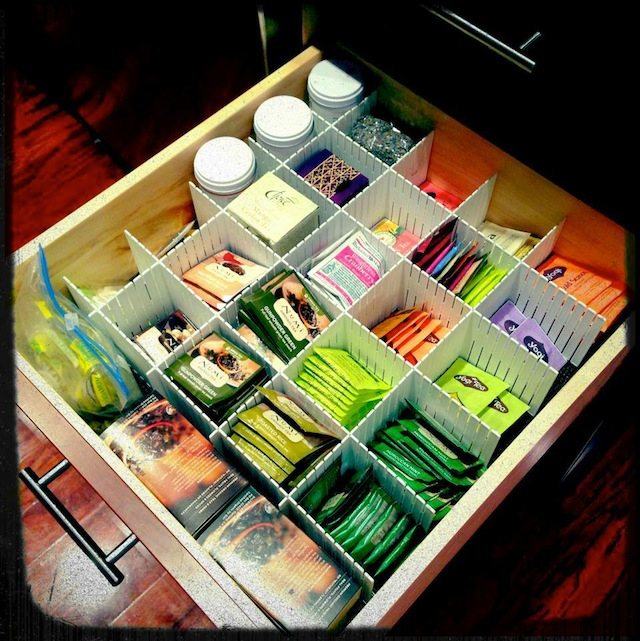 The ancient Chinese tradition of drinking tea dates back thousand of years to the early Chinese dynasties and aristocrats who drank the beverage for its medicinal properties. In ancient times, leaves from the Camellia Sinensis (the tea plant) were either ground into a powder or placed as loose leaves directly into water to infuse it with herbal essence. Unfortunately, modern day tea is nothing like the unadulterated version of old tea. Many of today’s tea brands are operating under the guise of providing health benefits and promoting clean living, but are actually laden with pesticides, toxins, artificial ingredients, added flavors and GMOs.
The ancient Chinese tradition of drinking tea dates back thousand of years to the early Chinese dynasties and aristocrats who drank the beverage for its medicinal properties. In ancient times, leaves from the Camellia Sinensis (the tea plant) were either ground into a powder or placed as loose leaves directly into water to infuse it with herbal essence. Unfortunately, modern day tea is nothing like the unadulterated version of old tea. Many of today’s tea brands are operating under the guise of providing health benefits and promoting clean living, but are actually laden with pesticides, toxins, artificial ingredients, added flavors and GMOs.
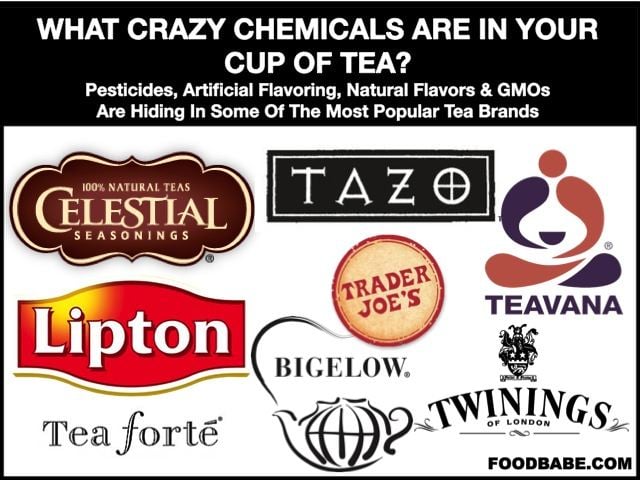
Conventional Teas – An Abundance of Pesticides
Did you know that most tea is not washed before it is put it into bags? That means if the tea was sprayed with cancer-causing pesticides, those pesticides go directly into your cup. And this is the reason why tea is on my organic shopping priority list. To prove this point, here are some shocking facts about one of the most well-known tea brands – Celestial Seasonings.
A recent third-party analysis by Glaucus Research and discussed here found that 91 percent of Celestial Seasonings tea tested had pesticide residues exceeding the U.S. limits. For example, Sleepytime Kids Goodnight Grape Herbal contained 0.26 ppm of propachlor, which is a known carcinogen under California’s Propsition 65.
The “Wellness” tea line was found to contain traces of propargite, also a known carcinogen and developmental toxin. The FDA has already issued two warning letters to Celestial Seasonings in regard to poor quality control according to this source. Imagine what happens when pesticide-laden tea is steeped in boiling water.
If grocery store brands don’t provide a clean option for you, perhaps a high-end loose leaf tea would circumvent some of the issues of grocery store brands. Right? Wrong! Take Teavana, which is found in malls across North America for example. Teavana taps into tea culture with the “Teavana Experience.” Convincing their employees to take customers on a sensory journey – they open a huge canister of loose leaf tea and wave the top of the canister so you can smell the tea – touting all of the wonderful health benefits of tea complete with samples and manipulative demonstrations that end in an expensive visit to the tea shop. Is all the extra money worth it? Are customers getting a superior tea product? No.
Teavana tea was tested by an independent lab and 100 percent of it was found to contain pesticides. One tea in particular, Monkey Picked Oolong, contained 23 pesticides. 77 percent of the teas would fail European Union pesticide import standards, and would be banned from import. 62 percent of the teas tested contained traces of endosulfan, a pesticide that has been banned by the U.S., China, the E.U., and 144 other countries because it has been linked to impaired fertility and could harm unborn babies.
UPDATE (May 27, 2014): Glaucus Research funded the research done by Eurofins Scientific (an independent lab) and admits on their disclaimer that they are biased because they would make money if Hain’s stock declines. However – I am not sure that Eurofins’ research should be completely discounted on this point alone. Since I wrote this post, Celestial has been sued in a class-action lawsuit based on the pesticides that Eurofins found in their teas and for mislabeling of them as “100% Natural”. The jury is still out on whether Eurofins’ research will be considered legit, as this case is still active in California. The Plaintiffs contend that Celestial’s teas contain “pesticides, herbicides, insecticides, carcinogens, and/or developmental toxins (collectively, “Contaminants”)” and Celestial “did not dispute – and has never disputed – that the tea Products contained Contaminants. Nor has (Celestial) challenged the results of the Eurofins Tests” and “has not claimed that Eurofins was biased or that the Eurofins Tests were not, in fact, accurate”. Even if it is determined that Eurofins’ research was not accurate – it’s important to note that Celestial’s tea that was tested is NOT organic and some of this tea is sourced from China. Greenpeace issued a report on the alarming amount of pesticides found on tea from China, followed up by a detailed report on Lipton brand tea from China – in which they recommend only purchasing certified organic tea to avoid these pesticides. Reference law documents: Complaint; Plaintiff’s Memo in Opposition to Motion to Dismiss. Case 8:13-cv-01757-AG-AN
Teas Can Contain Artificial Flavoring, Natural Flavors, and Hidden GMOs
Furthermore, a majority of Teavana teas contain added flavor – specifically “artificial flavoring.” If their tea is so high end, why would they be adding ingredients produced by fractional distillation and chemical manipulation of various chemicals like crude oil or coal tar? Coal tar in my tea? No, thanks.
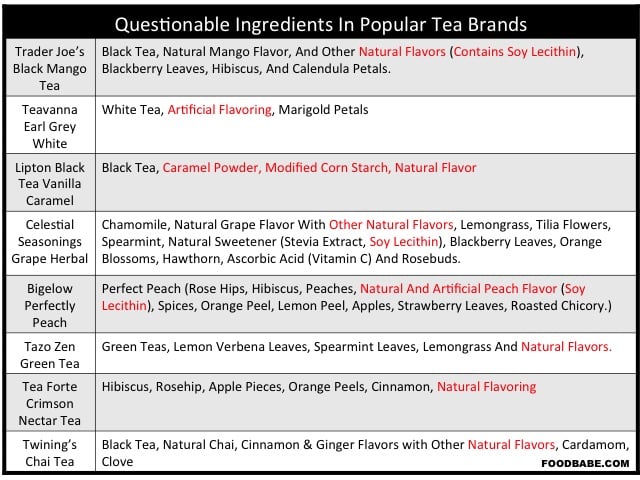
Many popular tea brands get away with using the ingredient “natural flavors” to trick the consumer into thinking they are buying better, cleaner ingredients; however companies are just covering up the inferior taste and low quality of their tea. Fortunately, there are brands that are putting the kibash on the use of natural flavors and using all real ingredients. I was happy to learn that Ahmed Rahim, CEO of Numi Tea is just as disgusted by this ingredient as I am. He said to me “You can breakdown anything that is found in nature and if it ends up tasting like the flavor you wish to use – you can add it to any product and call it NATURAL FLAVOR on the ingredient label. It could come from a stone in the ground and you’d never know.” This is why when I see the words “natural flavor” listed on a label – I put the product down and run far far away. I want to know what I am eating! Don’t you?
Additionally, the added risk of consuming possible GMOs is not something many people think about when consuming teas. Before this investigation and witnessing tea companies using modified corn starch and soy lecithin in tea (additives likely made from genetically engineered corn and soy), I didn’t think about it either! I can’t imagine having a serious soy allergy, considering all the places companies try to hide it.
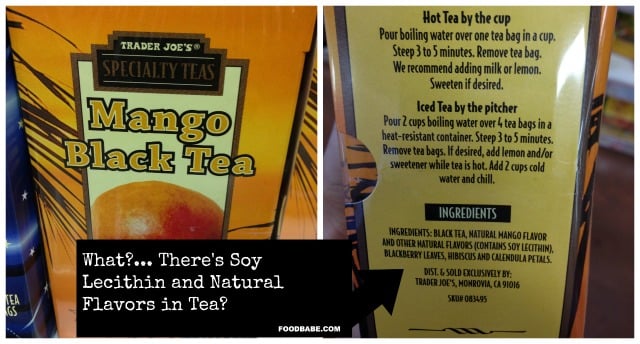
Why The Tea Bag & Packaging Matters
A recent article in The Atlantic discusses the “silky sachet” and “luxurious mesh bags” that hold loose leaf teas (like in brands Tea Forte and Mighty Leaf). Turns out, these modern day bags meant to showcase the tea leaves, are made of plastic.
PLA (polylactic acid) is a (likely GMO) corn-based tea bag material that has attracted major tea companies due to its nice look and its claims of biodegradability. Terms like “silky sachets” and “corn-based biodegradable tea bags” mislead customers into believing a product is more natural and sustainable than it really is. While the processing for PLA removes all traces of genetic material, it is still made with genetically modified corn. Although the actual tea bag is not an ingredient like teas and herbs, it is an element that is put into boiling water.
According to The Atlantic, tea bags are most commonly made from food grade nylon or polyethylene terephthalate (PET) which are two of what’s considered the safest plastics on the scale of harmful leaching potential. However, Dr. Mercola disagrees, he states:
“While these plastics are generally considered among the safest in terms of leaching potential, the molecules in these plastic tea bags may still in fact break down and leach out when steeped in boiling water…” Well, isn’t that how tea is prepared?
Another temperature consumers need to worry about in tea is the “glass transition” temperature. Here’s the science behind the glass transition temperature or, Tg, and why it becomes dangerous according to The Atlantic:
“That is the temperature at which the molecule in certain materials such as polymers begin to break down. As a rule, the Tg of a material is always lower than the melting point. In the case of PET and food grade nylon (either nylon 6 or nylon 6-6), all have a Tg lower than the temperature of boiling water. For example, while the melting point of PET is 482 degrees Fahrenheit, the Tg is about 169 degrees. Both nylons have a lower glass transition temperature than PET. (Remember that water boils at 212 degrees.) This means the molecules that make up these plastic tea bags begin to break down in hot water.”
So, while the plastic itself won’t melt in your tea, the glass transition temperature could potentially leak out harmful phthalates if there are such things in your tea. Another thing to worry about is that some of the newer tea bags are made with a variety of plastics. Some plastics are nylon, some are made of viscose rayon, and others are made of thermoplastic, PVC or polypropylene.
Beware of paper tea bags too, which can be worse than plastic tea bags.
GET THIS: Also according to Dr. Mercola, many “paper tea bags are treated with epichlorohydrin, a compound mainly used in the production of epoxy resins. Considered a potential carcinogen by the National Institute for Occupational Safety and Health2 (NIOSH), epichlorohydrin is also used as a pesticide. When epichlorohydrin comes in contact with water, it hydrolyzes to 3-MCPD, which has been shown to cause cancer in animals. It has also been implicated in infertility (it has a spermatoxic effect in male rats) and suppressed immune function.”
So what do you do the next time you want a cup of tea? Antioxidant rich teas aren’t going to do much to counterbalance the chemicals, additives and artificial flavorings in today’s modern teas.
First, I recommend looking at this chart below to see how your favorite tea brand stacks up:
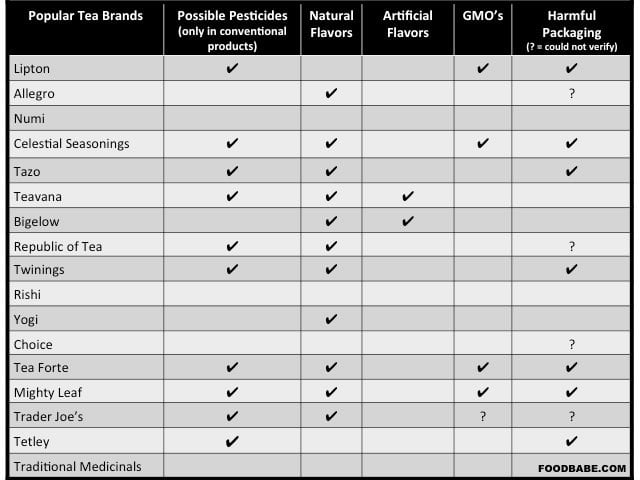
And then when brewing and picking out the safest tea remember these tips:
1. Choose an organic & non-GMO certified brand of tea. (My favorites are Numi, Traditional Medicinals, and Rishi Tea (loose leaf)).
2. Check the ingredient list on the back of the tea package to make sure there are no added flavors, GMO ingredients like soy lecithin and corn starch added to the tea leaves.
3. Make sure the brand you buy uses a safe form of packaging material or buy loose leaf tea and use a stainless steel or glass tea strainer. Have the company verify that bags do not contain epichlorophydrin, and avoid plastic tea bags all together. (Numi and Traditional Medicinals are some of the only brands I trust in this category because they have publicly stated they do not use this harmful ingredient or GMO packaging and are Non-GMO Project verified.)
4. The majority of restaurants use some of the most pesticide ridden tea and brands that have harmful packaging like Celestial Seasonings, Lipton, etc. Don’t fall victim to this. Bring your own tea when eating out or going to restaurants and ask for pot or cup of boiling water (remember to leave a good tip if you do this). I even do this at Starbucks because I like to vote with my dollars and not buy tea brands that are harmful. If you drink iced tea, brew your own at home and carry an insulated water bottle with you.
5. Remember these temps and times for brewing the perfect cup of tea
If you know someone who loves to drink tea, please share this post with them. I was just as shocked as you probably are about all of this craziness – knowing what’s in our tea and what we put in our body matters! Let’s change the world together.
Xo,
Vani


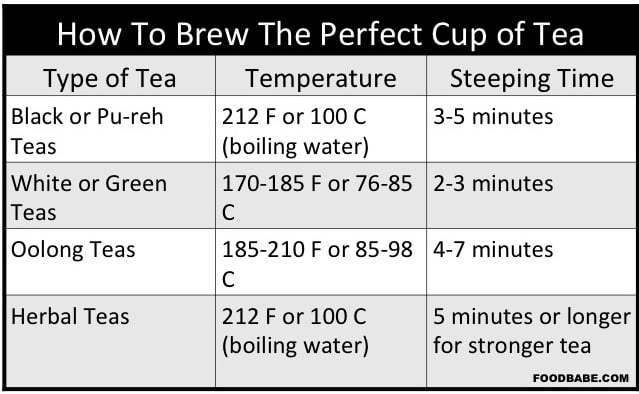


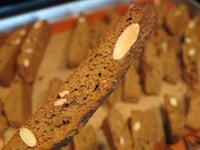
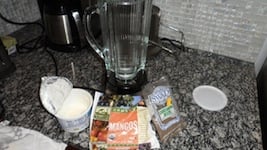


Any idea of the situation in South Africa? And which are the safe brands????
I use Teaspoon Tips loose tea.
You can buy loose organic rooibos from Upton Tea Company.
Did you happen to investigate Zhena’s Gypsy Tea? I’d be interested in how they measured up against the others. Glad to find out that my favorite (Numi) came out on top!
Food Babe,
What kind of tea do you drink and from where?
Thank you for your response in advance?
I drink Irish Breakfast tea from Trader Joe’s and I also drink Rooibos from South Africa.
What about Higgins and Burke brand???
THANK YOU
Thx Food Babe, was PG Tips are the naughty list?
I would like to know about pg tips too!
Great piece Food Babe!! What do we know about PG Tips?
I just contacted PG Tips to ask about their use of epichlorophydrin. Here is their response:
“The paper used to make our tea bags that are sold in retail shops in the UK is not manufactured using epichlorophydrin polymer.
The teabag papers used by Unilever fulfil all requirements of worldwide legislation for papers which are in direct contact with food.”
What about the ingredients in Murchies tea?
any reply on murchies yet?
All food products are required to list their ingredients. Look for yourself, on everything you buy.
I’m happy to comment of CC Tea which has become one of my need in my day to day life. The nutrition present in CC Tea gives me freshness and makes me a healthy person. I suggest to all my beloved people to try this product for a healthy body. Thanks to Sui Generis.
What are your thoughts on yerba matte (brewed like coffee) or Dandy Blend (coffee substitute)? I am aware yerba matte is a stimulant and Dandy Blend is not. I’d like direction on which hot drink is beneficial given I like to consume at least 2 cups per day. Thanks!
yerba mate is super stimulant, even stronger than coffe
Your source stating that Mighty Leaf tea contains harmful plastic and GMO is inaccurate. I read the original article, and this disclaimer is at the bottom of it:
*This post was updated on June 4, 2013, to remove a reference to Mighty Leaf Tea. Mighty Leaf uses bags made of corn plastic, which do not contain phthalates and do not leach even at boiling temperatures.
You may want to investigate further or adjust your review accordingly before Mighty Leaf Tea sees your review and takes legal action.
I wondered is there is a difference between the organic Mighty Leaf and the non organic when it comes to the tested variables such as pesticides. Also who funded this study?
Thanks
Emi Hosoda MD
If the above weight loss suggestions are not suitable
for you there is another product you could try. Pterostilbene is one natural compound that has been garnering
a lot of attention because of its health benefits.
Garcinia morella is a close relative of Garcinia indica and Garcinia cambogia ,
which is widely used as a weight loss aid.
BE VERY AWARE of the company selling the supplement Garcinia Cambogia Supplements! I’ve had nightmares trying to cancel my trial subscription and them falsely charging my credit card! Try to cancel your trail and they tell you they don’t see you in the system as a customer! Then try to get the charges removed! Horrible company!
Visit us http://www.ourspecialtea.com
I bought CC Tea because it is organic. I knew I was getting a healthy product but what I got was much more. The taste is really good. It is fresh, smooth and full bodied. You will be pleased with this high quality tea.
I just noticed when I was in Teavana that there are artificial flavorings (AF’s) in their teas. I came home and called to ask about this & the employee I spoke to got very defensive, kept interrupting me and went off on a rant that they do not use GMO’s. I told her that I was not asking about GMO’s but about AF’s and she went on another tirade that teas with ‘champagne’ in the name do not have actual champagne, but have dried grapes. Still not at all relevant to my inquiry about AF’s. After some research, I have found that Teavana is most likely a member of the GMA (Grocery Manufacturers Association) which makes Monsanto look like saints. I am even hesitant to use the brewed tea in my composter. My husband will be happy that I will no longer spend money at Teavana which has been bought out by Starbucks (definitiely a member of GMA).
I’m a daily user of CC Tea. CC Tea is good for everything in general. it has given me health benefits. I wish Sui Generis to continue producing CC Tea lifelong in public interest.
Hello, I am wondering what your thoughts are on Teatulia brand? They are USDA Organic and rainforest alliance certified. I called and spoke to their Rep and she said their tea bags are made from Non GMO Corn Silk.
Thank you
I just bought teatulia and was happy to see that the only ingredient was “organic black tea leaves” thanks for the info on their bags too!
Thank you foodbabe for opening my eyes to tea I buy and use everyday. Since I do not soda I mostly drink tea, water and juice. Thanks for the article and keep up the good work.
As soon as I read this post, I immediately read the label for my go-to tea and was very disappointed. Harney & Sons uses artificial and natural flavors. Seriously? You need to use both natural AND artificial vanilla in your Paris tea?! Sad thing is (probably no surprise) that it’s hard to find the ingredients for all their flavors on their website. Boo!
Dangit, I was wondering about Harney & Sons as well. Well there goes my whole tea cabinet, I have I think one type that isn’t one of the major brands listed in this article.
I didn’t like the taste of CC tea earlier then I drink often which has made me to cease other tea products. The shocking thing is that without any side effect in the body my weight has reduced.From this I could believe that these tea leaves are totally natural and is one of the medicine. I’m so grateful to Sui Generis.
Help! I love tea. I go online and buy mostly loose life from China, because some come direct from the farmer and you can eliminate the middle man. I think it tastes better and is probably better for you…or so I thought.
How can I check to see if its safe?
PDF
Thank you so much for all your help on tea! I drank Starbucks tea for years even though I would get a headache and fatigue after drinking. I heard things about pesticides but sometimes things take me a long time to investigate. I didn’t know where to start when I decided to start brewing my own loose leaf tea…..And guess what was so conveniently there when I decided to do so…Teavana! I bought their tea even after the salesperson told me it had pesticides and wasn’t organic but I just wanted to get started.
Anyway glad I stumbled on to the teas you recommended because I didn’t know which ones to try and trust. I’m throwing out the rest of my Teavana tea and cant wait until my Rishi tea comes! Thank you again!
HI Vani!
Thank-you for every thing you do…I love reading your posts and investigations!!
I was wondering if you did any research on Yerba Mate Guayaki
I would love to hear from you!! Thank-you!!!
I wrote to republic of tea about their organic teas and asked what the bags were made of. Here is their responses were:
They are made from unbleached wood pulp fibers.
AND
Thank you for your email. Our tea bags do not contain epichlorohydrin and it is not used in the process of making our tea bags.
So they look good to go!
too much info can i get the clift notes?
any idea if the black team from Herba Natural is organic and pesticide free? I didn’t see it on the chart? Their website is http://www.herbanatural.com/
Hi Everyone, I am a tea lover and have started importing my own tea from Sri lanka with NO GENETICALLY MODIFIED ORGANISMS. Check out my website if you are interested in a real cup of Ceylon (Sri Lankan) tea! http://www.jandgtea.com
What about Luzianne Tea, I use a 1:1 ratio of decaf and regular tea to make ice tea. Thanks, Jean
I drink Newman’s Own organic black tea. I contacted the company to check if their bags are treated with epichlorohydrin. Here is their response:
Thank you for your interest in the Newman’s Own Organic Teas.
Our tea bag filter paper is primarily made of abaca, a manila hemp, and is
a natural material.
We’ve gotten many requests such as yours recently, so we had our Technical
Director contact our filter paper supplier and this is what she has found:
Response to Epichlorohydrin inquires:
All filter paper tea bag types used for Newman’s Own Organic Teas are safe
for direct food contact. They have all been tested for epichlorohydrin /
3-MCPD residues to ensure that they meet FDA regulations for materials in
direct contact with food.
Recent testing by an outside lab shows epichlorohydrin is non-detectable in
the filter paper.
I hope this addresses your concerns.
Tina Coccodrilli
Brand Manager
I noticed all your links to Amazon; any thoughts on Organic MerryMint green tea imported by Stash Tea also sold on Amazon?
Thanks for a great article!
The tea steeping chart is missing rooibos, which shouldn’t be brewed longer than five minutes. If people mistake it for herbal tea, they might steep it too long and it gets bitter.
Also, I was wondering about Yogi tea. I am always interested in their teas but they contain natural flavoring so I avoid them. What is in natural flavoring? Is it all bad?
How about Good Earth Teas? i didn’t see any comment about that one.
Thank you for this, as all I drink is tea!
Have you found anything in the brand STASH?
What about Whole foods brand .. Green tea ???? It’s says usda on the box. ??!! Please respond cause I drink it everyday… I had BC and I’m really trying to eat clean .. No GMOs etc !! Thank you
Diana
Try looking up dr. green tee. I think you will be pleasantly surprised.
FoodBabe-
I recall you posting a picture of “Yogi” brand tea that you were drinking during one of your juice fasts. Did you just recently discover this was a brand you do not recommend or was that specific flavor OK to drink? Confused…
Trader joes brand items are all non GMO so you don’t need a question mark there in your chart. This is a well known fact and in surprised you don’t know this. It makes me think the rest of your article is invalid.
the well known fact is food babe’s position on trader joe’s claims. You might want to look that up.
It is a well known fact that food babe has called out trader joes on their claim of being gmo free.
Stash Tea is looking like another healthy alternative…I’ve checked all the varieties in my cupboard and only real ingredients are used (except for a couple with ingredients like “lemon flavor” which might or might not be bad). I called the customer service number and they verified that they’re paper tea bags do NOT include epichlorohydrin. Does anyone have any sources with information about Stash that we should consider?
How did you find out this information about the various tea companies?
There are a few that you have not listed that I’d like to investigate, but don’t know where to look to see where they’d land on that scoresheet.
Hi Vani,
Thanks for this great body of research! I too am always watching the ingredients in my foods, which is why your efforts are so important.
I appreciate a good tea and have been formulating herbal infusion blends for 25 years. I source the highest quality pesticide-free herbs and, without adding natural or artificial flavors, make good tasting teas. It CAN be done!
I invite you to try our wild-crafted and organic loose leaf tea blends. Let me know if I can send you a sample.
Best Regards,
Kimberly
Over the years tea companies have cut their tea leaves and blended with leaves from other regions to increase profits. Sadly, this compromises the integrity of the tea. After 22 years, Dilmah remains a family owned estate which has never compromised the integrity of the whole tea leaf. It is single origin, estate grown, whole leaf tea. The only added flavors are natural and have health benefits and it is packed fresh within 3 days of hand picking, thus retains 3 times the antioxidants of other teas. They are widely know internationally, but very little attention is given to real tea in the US. We are easily swayed by marketing plans here. Dilmah puts proceeds into over 110 Humanitarian and Conservation projects yearly to lift their Countrymen in Sri Lanka and to sustain the industry that has made them a global brand. They are a fantastic role model as a business and the best tea company I know.
Thank you for this useful information. Next time I go to Fresh market I will look for Numi and Reshi teas. Do you have a favorite portable container/mug you put your tea in when on the go…… Glass or metal or ceramic. I don’t really like plastic. Also what type of tea pot do you heat your water in…..does the material matter?Thanks so much!
Have a blessed day!
Kristen
Such a good article. Also it’s a very good idea to “wash” your tea first. A traditional way of brewing tea. Pour boiling water over your tea let it sit for just a second or so then pour it off. This openes the leaf up and helps rinse off any residues. It doesn’t weaken the flavor if a good quality tea.
Also ALWAYS buy organic tea!
I love the tea drawer 🙂
Thanks for posting this article. Check out the article The Nourishing Home (Facebook) posted. The URL is http://www.kitchenstewardship.com/2014/02/07/are-organic-pesticidesor-the-fruit-itselfreally-worse-than-conventional-farming/ I was startled to learn that “organic” doesn’t mean the product is pesticide free!
Oh boy! This is really frightening. I love tea and drink at least two cups a day, mostly loose leaf.
I see on your tea drawer that you have Yogi Tea, but they have pesticides and added natural flavors… I love their Green Tea Kombucha tea.
Any chance you can look into David’s Tea? Likely not, it’s a Canadian brand.
You should make an app that lets your followers check to see if the item(s) is/are FoodBabe approved;)
Really appreciate your work!
Any idea about Benner tea bags from Aldi? I checked the label. One ingredient. And the bags are paper.
My husband converted me to tea when we first starting dating 9 years ago! We drink Yorkshire Tea or PG Tips. They both just say ingredients: BLACK TEA. Should we be worried that it is full of all the bad stuff? x alli
What about Gaia teas? Do these have pesticides and toxins? They are organic.
geeze . . . and I was just getting to love my daily variety of tea. Oh Shucks.
That’s why I only drink organic loose leaf tea!